University of Sunderland FHS115 Placement Handbook for Students
VerifiedAdded on 2023/01/09
|48
|7742
|28
Report
AI Summary
This document serves as a comprehensive placement handbook for the FHS115 Work Based Learning module at the University of Sunderland in London, specifically for the Health and Social Care Foundation programme. It provides essential information for both students and placement providers, detailing learning outcomes, general information, planning and preparation, supervision guidelines, and assessment criteria. The handbook outlines the structure of the placement, which involves 50 hours of work-based practice, and emphasizes the development of skills such as applying theory to practice and reflective analysis. The assessment includes a portfolio comprising a presentation on organizational theories, a reflective report, and a learning contract. The document also includes additional guidelines for students impacted by the COVID-19 pandemic, offering alternative assessment options. It also contains a student logbook, assessment details, and guidelines for both students and placement providers. The handbook underscores the importance of professional placements in enhancing employability and developing essential skills within the health and social care field.
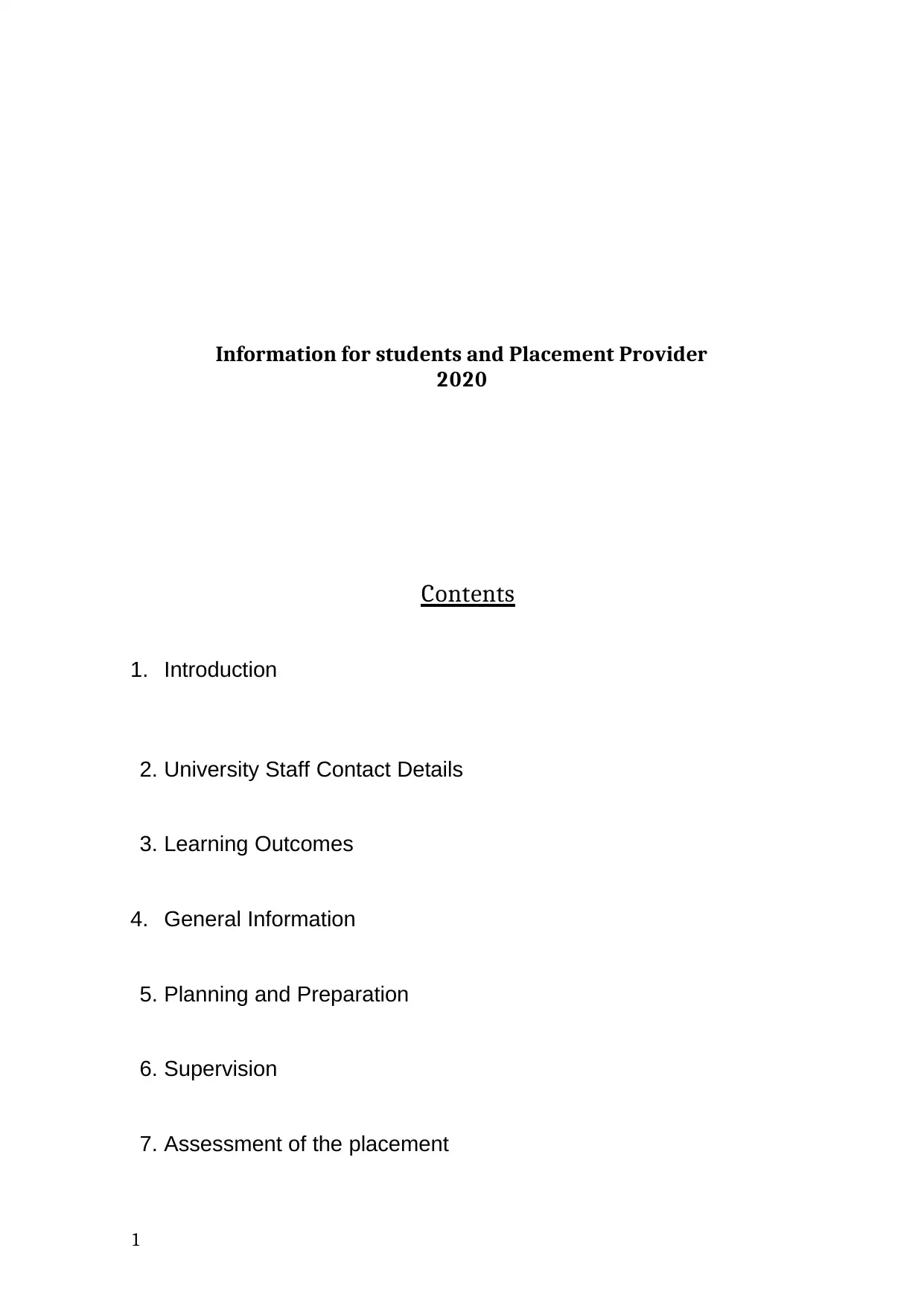
Information for students and Placement Provider
2020
Contents
1. Introduction
2. University Staff Contact Details
3. Learning Outcomes
4. General Information
5. Planning and Preparation
6. Supervision
7. Assessment of the placement
1
2020
Contents
1. Introduction
2. University Staff Contact Details
3. Learning Outcomes
4. General Information
5. Planning and Preparation
6. Supervision
7. Assessment of the placement
1
Paraphrase This Document
Need a fresh take? Get an instant paraphrase of this document with our AI Paraphraser
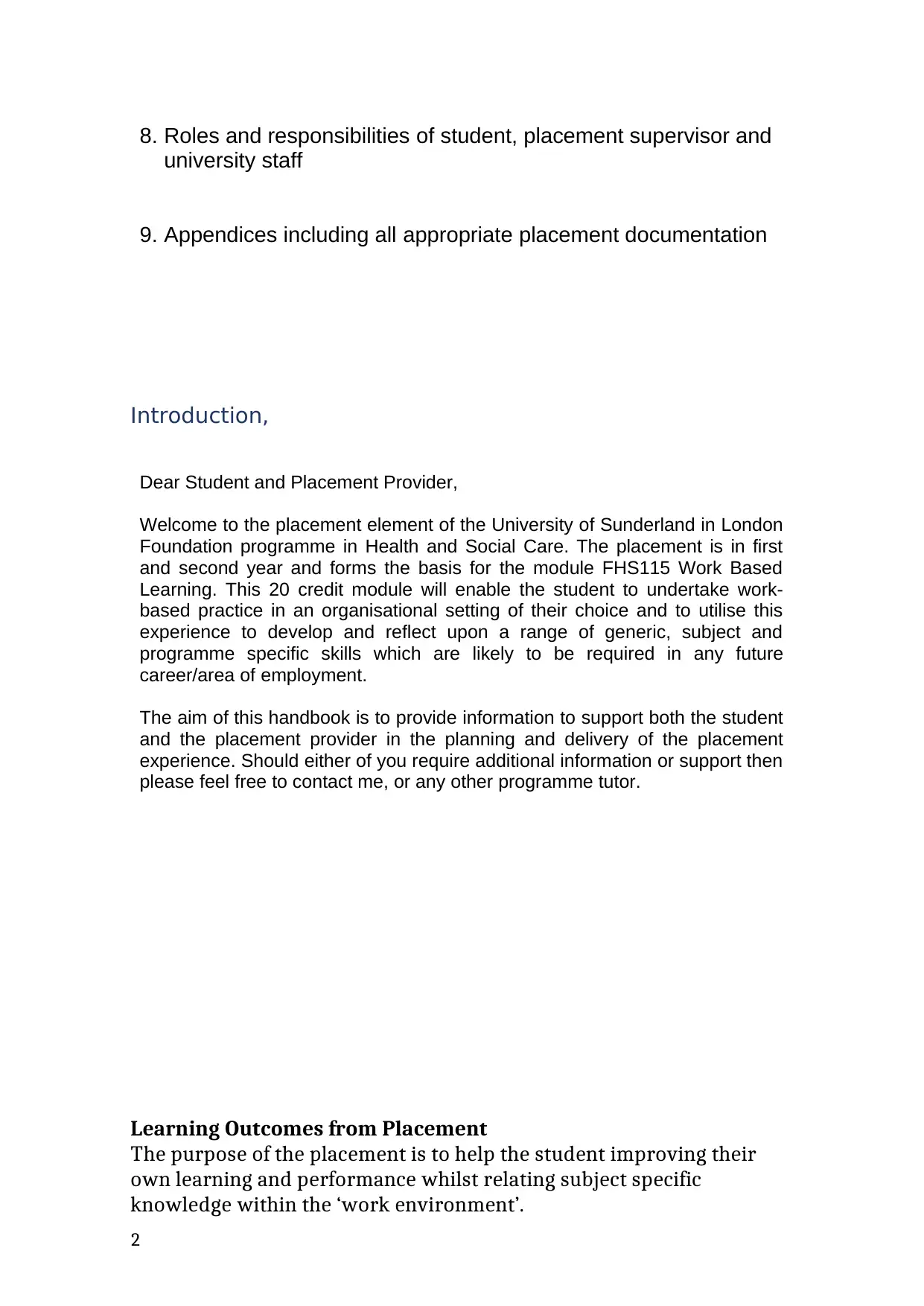
8. Roles and responsibilities of student, placement supervisor and
university staff
9. Appendices including all appropriate placement documentation
Introduction,
Dear Student and Placement Provider,
Welcome to the placement element of the University of Sunderland in London
Foundation programme in Health and Social Care. The placement is in first
and second year and forms the basis for the module FHS115 Work Based
Learning. This 20 credit module will enable the student to undertake work-
based practice in an organisational setting of their choice and to utilise this
experience to develop and reflect upon a range of generic, subject and
programme specific skills which are likely to be required in any future
career/area of employment.
The aim of this handbook is to provide information to support both the student
and the placement provider in the planning and delivery of the placement
experience. Should either of you require additional information or support then
please feel free to contact me, or any other programme tutor.
Learning Outcomes from Placement
The purpose of the placement is to help the student improving their
own learning and performance whilst relating subject specific
knowledge within the ‘work environment’.
2
university staff
9. Appendices including all appropriate placement documentation
Introduction,
Dear Student and Placement Provider,
Welcome to the placement element of the University of Sunderland in London
Foundation programme in Health and Social Care. The placement is in first
and second year and forms the basis for the module FHS115 Work Based
Learning. This 20 credit module will enable the student to undertake work-
based practice in an organisational setting of their choice and to utilise this
experience to develop and reflect upon a range of generic, subject and
programme specific skills which are likely to be required in any future
career/area of employment.
The aim of this handbook is to provide information to support both the student
and the placement provider in the planning and delivery of the placement
experience. Should either of you require additional information or support then
please feel free to contact me, or any other programme tutor.
Learning Outcomes from Placement
The purpose of the placement is to help the student improving their
own learning and performance whilst relating subject specific
knowledge within the ‘work environment’.
2
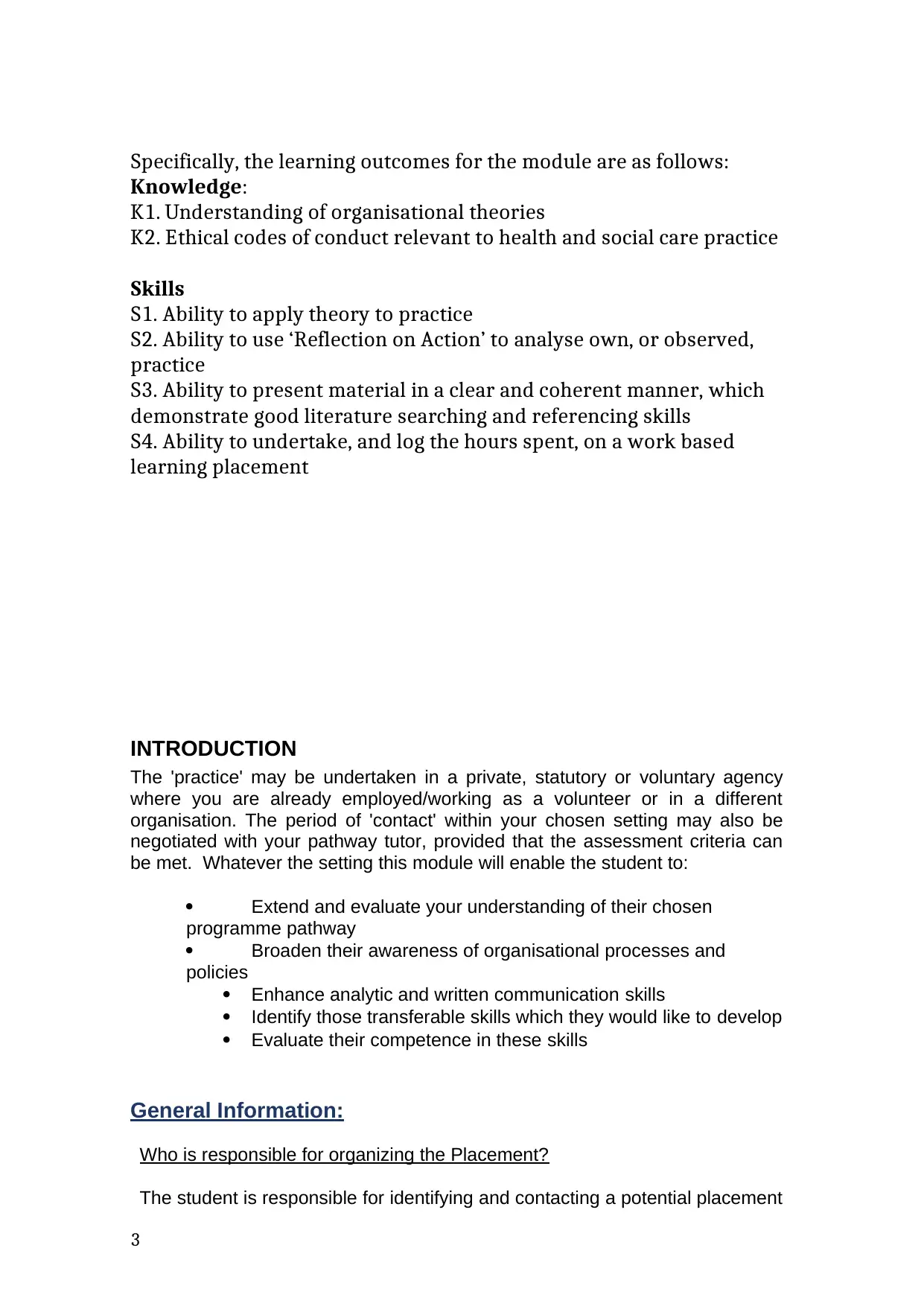
Specifically, the learning outcomes for the module are as follows:
Knowledge:
K1. Understanding of organisational theories
K2. Ethical codes of conduct relevant to health and social care practice
Skills
S1. Ability to apply theory to practice
S2. Ability to use ‘Reflection on Action’ to analyse own, or observed,
practice
S3. Ability to present material in a clear and coherent manner, which
demonstrate good literature searching and referencing skills
S4. Ability to undertake, and log the hours spent, on a work based
learning placement
INTRODUCTION
The 'practice' may be undertaken in a private, statutory or voluntary agency
where you are already employed/working as a volunteer or in a different
organisation. The period of 'contact' within your chosen setting may also be
negotiated with your pathway tutor, provided that the assessment criteria can
be met. Whatever the setting this module will enable the student to:
Extend and evaluate your understanding of their chosen
programme pathway
Broaden their awareness of organisational processes and
policies
Enhance analytic and written communication skills
Identify those transferable skills which they would like to develop
Evaluate their competence in these skills
General Information:
Who is responsible for organizing the Placement?
The student is responsible for identifying and contacting a potential placement
3
Knowledge:
K1. Understanding of organisational theories
K2. Ethical codes of conduct relevant to health and social care practice
Skills
S1. Ability to apply theory to practice
S2. Ability to use ‘Reflection on Action’ to analyse own, or observed,
practice
S3. Ability to present material in a clear and coherent manner, which
demonstrate good literature searching and referencing skills
S4. Ability to undertake, and log the hours spent, on a work based
learning placement
INTRODUCTION
The 'practice' may be undertaken in a private, statutory or voluntary agency
where you are already employed/working as a volunteer or in a different
organisation. The period of 'contact' within your chosen setting may also be
negotiated with your pathway tutor, provided that the assessment criteria can
be met. Whatever the setting this module will enable the student to:
Extend and evaluate your understanding of their chosen
programme pathway
Broaden their awareness of organisational processes and
policies
Enhance analytic and written communication skills
Identify those transferable skills which they would like to develop
Evaluate their competence in these skills
General Information:
Who is responsible for organizing the Placement?
The student is responsible for identifying and contacting a potential placement
3
⊘ This is a preview!⊘
Do you want full access?
Subscribe today to unlock all pages.

Trusted by 1+ million students worldwide
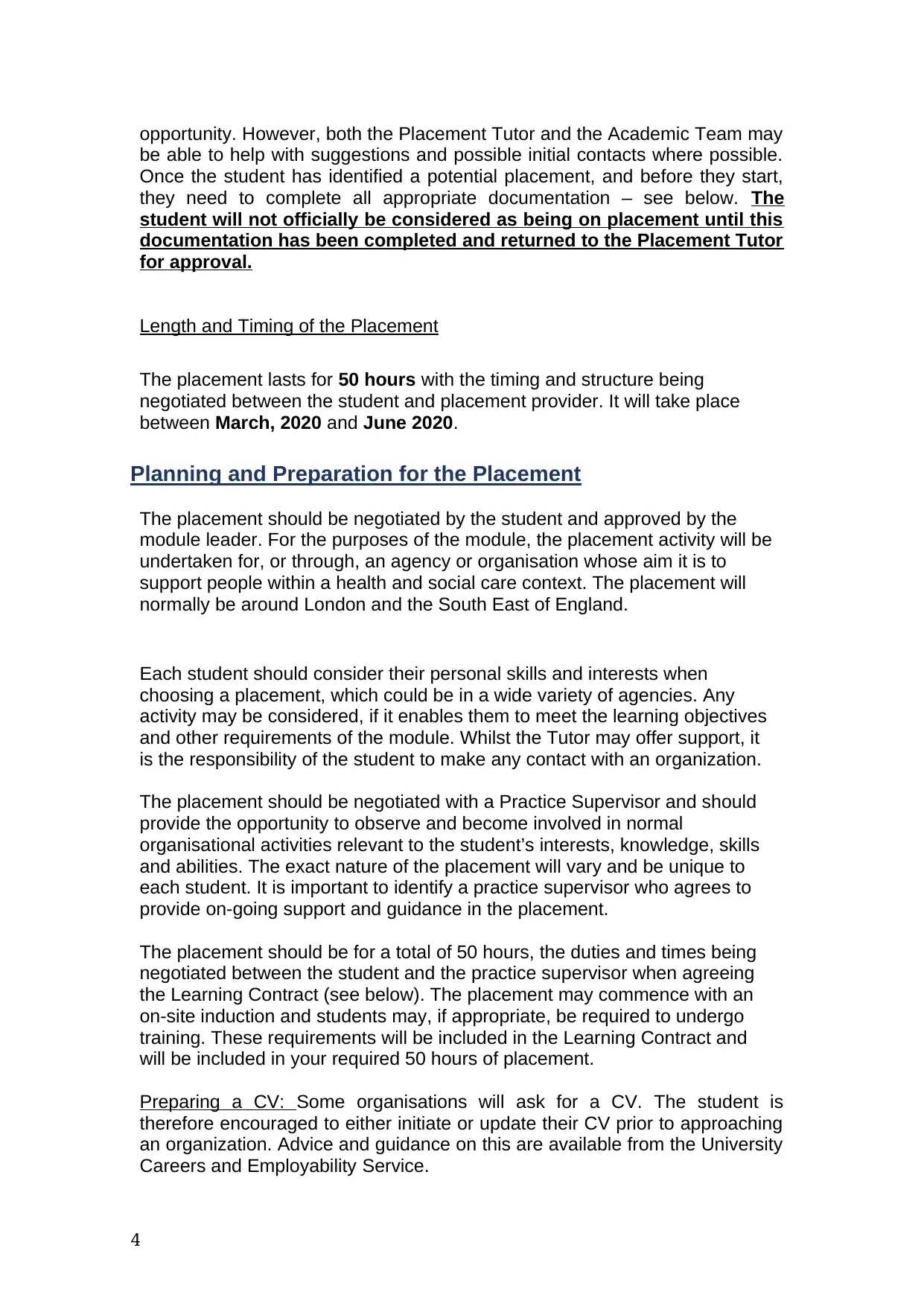
opportunity. However, both the Placement Tutor and the Academic Team may
be able to help with suggestions and possible initial contacts where possible.
Once the student has identified a potential placement, and before they start,
they need to complete all appropriate documentation – see below. The
student will not officially be considered as being on placement until this
documentation has been completed and returned to the Placement Tutor
for approval.
Length and Timing of the Placement
The placement lasts for 50 hours with the timing and structure being
negotiated between the student and placement provider. It will take place
between March, 2020 and June 2020.
Planning and Preparation for the Placement
The placement should be negotiated by the student and approved by the
module leader. For the purposes of the module, the placement activity will be
undertaken for, or through, an agency or organisation whose aim it is to
support people within a health and social care context. The placement will
normally be around London and the South East of England.
Each student should consider their personal skills and interests when
choosing a placement, which could be in a wide variety of agencies. Any
activity may be considered, if it enables them to meet the learning objectives
and other requirements of the module. Whilst the Tutor may offer support, it
is the responsibility of the student to make any contact with an organization.
The placement should be negotiated with a Practice Supervisor and should
provide the opportunity to observe and become involved in normal
organisational activities relevant to the student’s interests, knowledge, skills
and abilities. The exact nature of the placement will vary and be unique to
each student. It is important to identify a practice supervisor who agrees to
provide on-going support and guidance in the placement.
The placement should be for a total of 50 hours, the duties and times being
negotiated between the student and the practice supervisor when agreeing
the Learning Contract (see below). The placement may commence with an
on-site induction and students may, if appropriate, be required to undergo
training. These requirements will be included in the Learning Contract and
will be included in your required 50 hours of placement.
Preparing a CV: Some organisations will ask for a CV. The student is
therefore encouraged to either initiate or update their CV prior to approaching
an organization. Advice and guidance on this are available from the University
Careers and Employability Service.
4
be able to help with suggestions and possible initial contacts where possible.
Once the student has identified a potential placement, and before they start,
they need to complete all appropriate documentation – see below. The
student will not officially be considered as being on placement until this
documentation has been completed and returned to the Placement Tutor
for approval.
Length and Timing of the Placement
The placement lasts for 50 hours with the timing and structure being
negotiated between the student and placement provider. It will take place
between March, 2020 and June 2020.
Planning and Preparation for the Placement
The placement should be negotiated by the student and approved by the
module leader. For the purposes of the module, the placement activity will be
undertaken for, or through, an agency or organisation whose aim it is to
support people within a health and social care context. The placement will
normally be around London and the South East of England.
Each student should consider their personal skills and interests when
choosing a placement, which could be in a wide variety of agencies. Any
activity may be considered, if it enables them to meet the learning objectives
and other requirements of the module. Whilst the Tutor may offer support, it
is the responsibility of the student to make any contact with an organization.
The placement should be negotiated with a Practice Supervisor and should
provide the opportunity to observe and become involved in normal
organisational activities relevant to the student’s interests, knowledge, skills
and abilities. The exact nature of the placement will vary and be unique to
each student. It is important to identify a practice supervisor who agrees to
provide on-going support and guidance in the placement.
The placement should be for a total of 50 hours, the duties and times being
negotiated between the student and the practice supervisor when agreeing
the Learning Contract (see below). The placement may commence with an
on-site induction and students may, if appropriate, be required to undergo
training. These requirements will be included in the Learning Contract and
will be included in your required 50 hours of placement.
Preparing a CV: Some organisations will ask for a CV. The student is
therefore encouraged to either initiate or update their CV prior to approaching
an organization. Advice and guidance on this are available from the University
Careers and Employability Service.
4
Paraphrase This Document
Need a fresh take? Get an instant paraphrase of this document with our AI Paraphraser
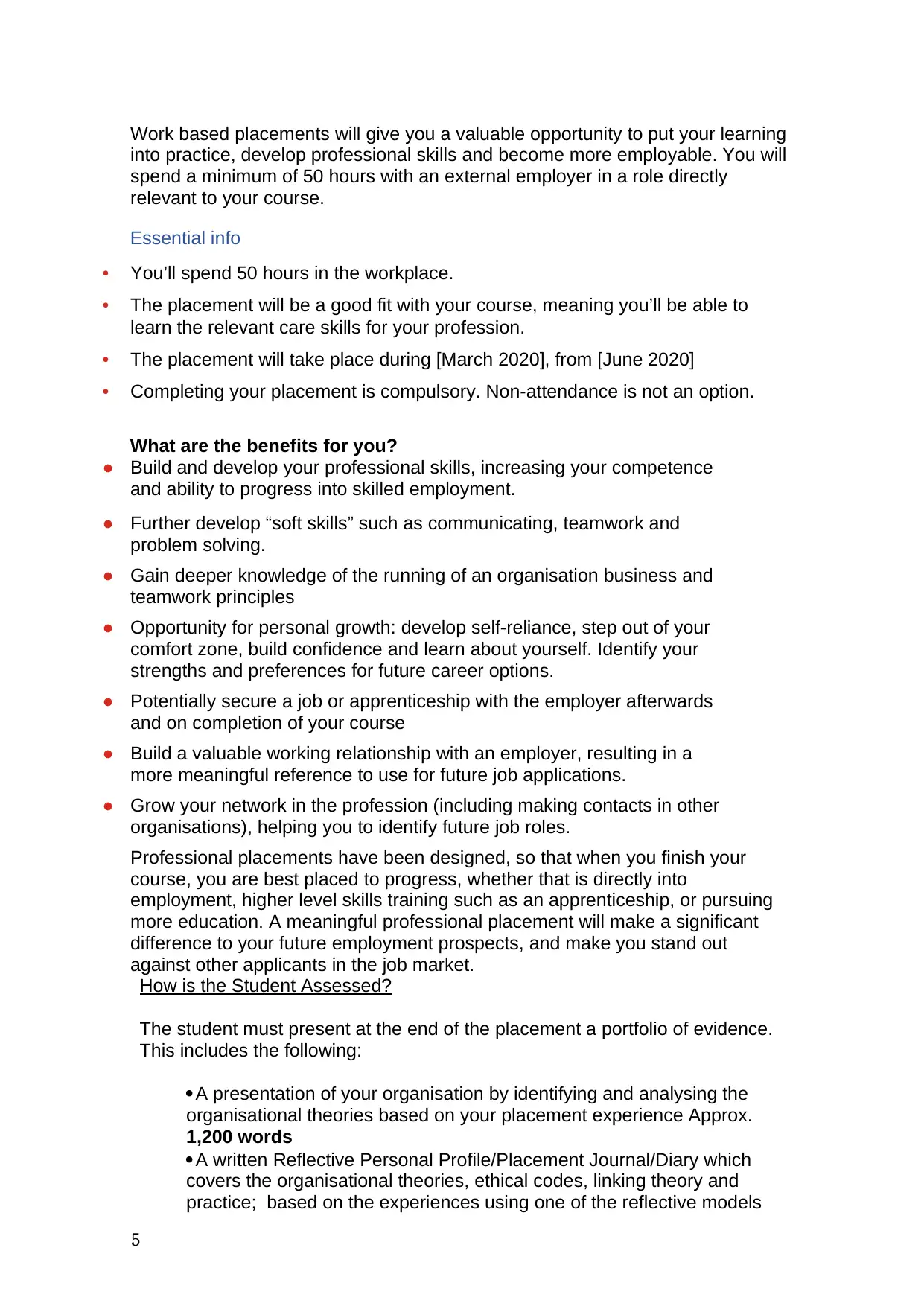
Work based placements will give you a valuable opportunity to put your learning
into practice, develop professional skills and become more employable. You will
spend a minimum of 50 hours with an external employer in a role directly
relevant to your course.
Essential info
• You’ll spend 50 hours in the workplace.
• The placement will be a good fit with your course, meaning you’ll be able to
learn the relevant care skills for your profession.
• The placement will take place during [March 2020], from [June 2020]
• Completing your placement is compulsory. Non-attendance is not an option.
What are the benefits for you?
● Build and develop your professional skills, increasing your competence
and ability to progress into skilled employment.
● Further develop “soft skills” such as communicating, teamwork and
problem solving.
● Gain deeper knowledge of the running of an organisation business and
teamwork principles
● Opportunity for personal growth: develop self-reliance, step out of your
comfort zone, build confidence and learn about yourself. Identify your
strengths and preferences for future career options.
● Potentially secure a job or apprenticeship with the employer afterwards
and on completion of your course
● Build a valuable working relationship with an employer, resulting in a
more meaningful reference to use for future job applications.
● Grow your network in the profession (including making contacts in other
organisations), helping you to identify future job roles.
Professional placements have been designed, so that when you finish your
course, you are best placed to progress, whether that is directly into
employment, higher level skills training such as an apprenticeship, or pursuing
more education. A meaningful professional placement will make a significant
difference to your future employment prospects, and make you stand out
against other applicants in the job market.
How is the Student Assessed?
The student must present at the end of the placement a portfolio of evidence.
This includes the following:
A presentation of your organisation by identifying and analysing the
organisational theories based on your placement experience Approx.
1,200 words
A written Reflective Personal Profile/Placement Journal/Diary which
covers the organisational theories, ethical codes, linking theory and
practice; based on the experiences using one of the reflective models
5
into practice, develop professional skills and become more employable. You will
spend a minimum of 50 hours with an external employer in a role directly
relevant to your course.
Essential info
• You’ll spend 50 hours in the workplace.
• The placement will be a good fit with your course, meaning you’ll be able to
learn the relevant care skills for your profession.
• The placement will take place during [March 2020], from [June 2020]
• Completing your placement is compulsory. Non-attendance is not an option.
What are the benefits for you?
● Build and develop your professional skills, increasing your competence
and ability to progress into skilled employment.
● Further develop “soft skills” such as communicating, teamwork and
problem solving.
● Gain deeper knowledge of the running of an organisation business and
teamwork principles
● Opportunity for personal growth: develop self-reliance, step out of your
comfort zone, build confidence and learn about yourself. Identify your
strengths and preferences for future career options.
● Potentially secure a job or apprenticeship with the employer afterwards
and on completion of your course
● Build a valuable working relationship with an employer, resulting in a
more meaningful reference to use for future job applications.
● Grow your network in the profession (including making contacts in other
organisations), helping you to identify future job roles.
Professional placements have been designed, so that when you finish your
course, you are best placed to progress, whether that is directly into
employment, higher level skills training such as an apprenticeship, or pursuing
more education. A meaningful professional placement will make a significant
difference to your future employment prospects, and make you stand out
against other applicants in the job market.
How is the Student Assessed?
The student must present at the end of the placement a portfolio of evidence.
This includes the following:
A presentation of your organisation by identifying and analysing the
organisational theories based on your placement experience Approx.
1,200 words
A written Reflective Personal Profile/Placement Journal/Diary which
covers the organisational theories, ethical codes, linking theory and
practice; based on the experiences using one of the reflective models
5
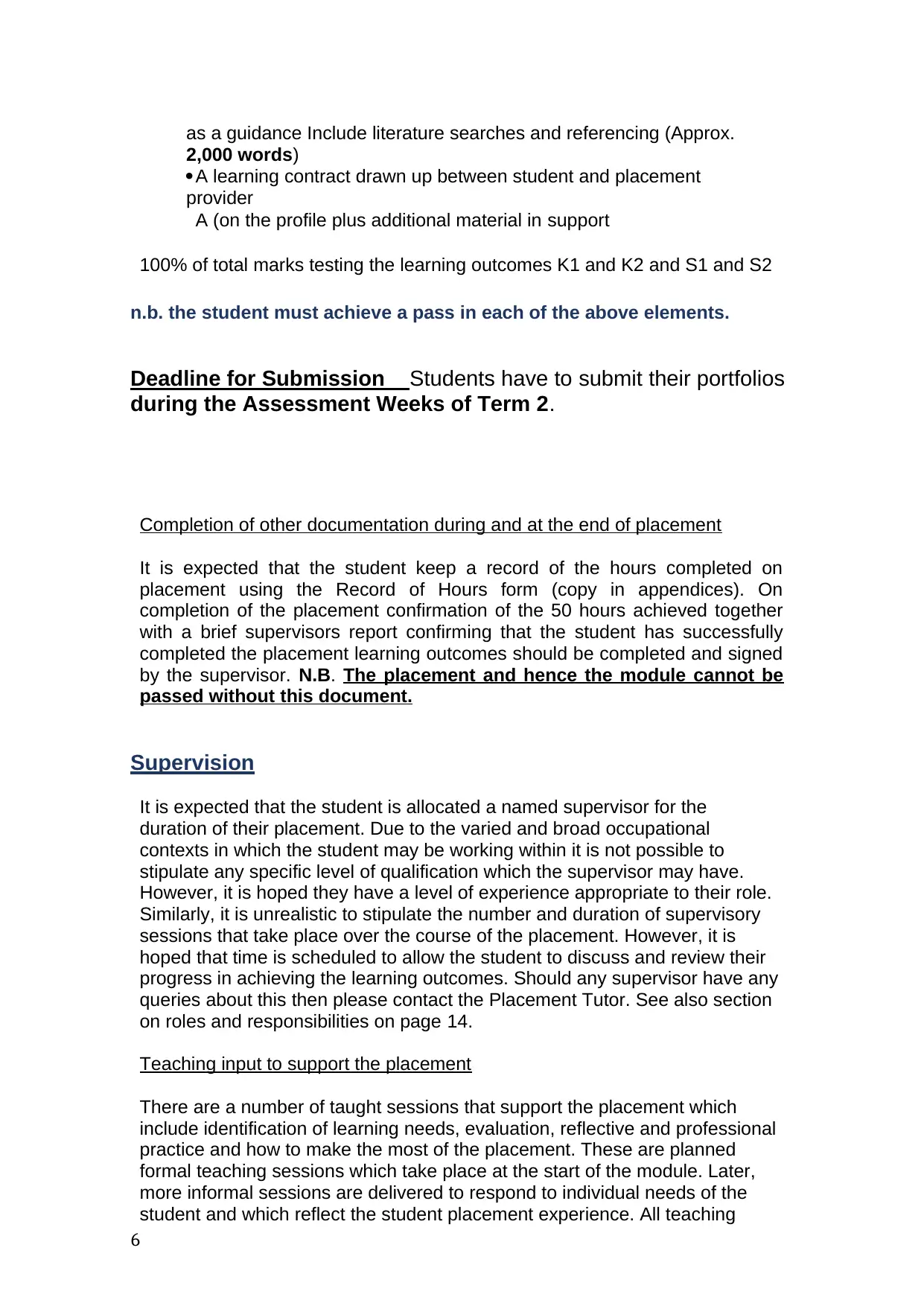
as a guidance Include literature searches and referencing (Approx.
2,000 words)
A learning contract drawn up between student and placement
provider
A (on the profile plus additional material in support
100% of total marks testing the learning outcomes K1 and K2 and S1 and S2
n.b. the student must achieve a pass in each of the above elements.
Deadline for Submission Students have to submit their portfolios
during the Assessment Weeks of Term 2.
Completion of other documentation during and at the end of placement
It is expected that the student keep a record of the hours completed on
placement using the Record of Hours form (copy in appendices). On
completion of the placement confirmation of the 50 hours achieved together
with a brief supervisors report confirming that the student has successfully
completed the placement learning outcomes should be completed and signed
by the supervisor. N.B. The placement and hence the module cannot be
passed without this document.
Supervision
It is expected that the student is allocated a named supervisor for the
duration of their placement. Due to the varied and broad occupational
contexts in which the student may be working within it is not possible to
stipulate any specific level of qualification which the supervisor may have.
However, it is hoped they have a level of experience appropriate to their role.
Similarly, it is unrealistic to stipulate the number and duration of supervisory
sessions that take place over the course of the placement. However, it is
hoped that time is scheduled to allow the student to discuss and review their
progress in achieving the learning outcomes. Should any supervisor have any
queries about this then please contact the Placement Tutor. See also section
on roles and responsibilities on page 14.
Teaching input to support the placement
There are a number of taught sessions that support the placement which
include identification of learning needs, evaluation, reflective and professional
practice and how to make the most of the placement. These are planned
formal teaching sessions which take place at the start of the module. Later,
more informal sessions are delivered to respond to individual needs of the
student and which reflect the student placement experience. All teaching
6
2,000 words)
A learning contract drawn up between student and placement
provider
A (on the profile plus additional material in support
100% of total marks testing the learning outcomes K1 and K2 and S1 and S2
n.b. the student must achieve a pass in each of the above elements.
Deadline for Submission Students have to submit their portfolios
during the Assessment Weeks of Term 2.
Completion of other documentation during and at the end of placement
It is expected that the student keep a record of the hours completed on
placement using the Record of Hours form (copy in appendices). On
completion of the placement confirmation of the 50 hours achieved together
with a brief supervisors report confirming that the student has successfully
completed the placement learning outcomes should be completed and signed
by the supervisor. N.B. The placement and hence the module cannot be
passed without this document.
Supervision
It is expected that the student is allocated a named supervisor for the
duration of their placement. Due to the varied and broad occupational
contexts in which the student may be working within it is not possible to
stipulate any specific level of qualification which the supervisor may have.
However, it is hoped they have a level of experience appropriate to their role.
Similarly, it is unrealistic to stipulate the number and duration of supervisory
sessions that take place over the course of the placement. However, it is
hoped that time is scheduled to allow the student to discuss and review their
progress in achieving the learning outcomes. Should any supervisor have any
queries about this then please contact the Placement Tutor. See also section
on roles and responsibilities on page 14.
Teaching input to support the placement
There are a number of taught sessions that support the placement which
include identification of learning needs, evaluation, reflective and professional
practice and how to make the most of the placement. These are planned
formal teaching sessions which take place at the start of the module. Later,
more informal sessions are delivered to respond to individual needs of the
student and which reflect the student placement experience. All teaching
6
⊘ This is a preview!⊘
Do you want full access?
Subscribe today to unlock all pages.

Trusted by 1+ million students worldwide
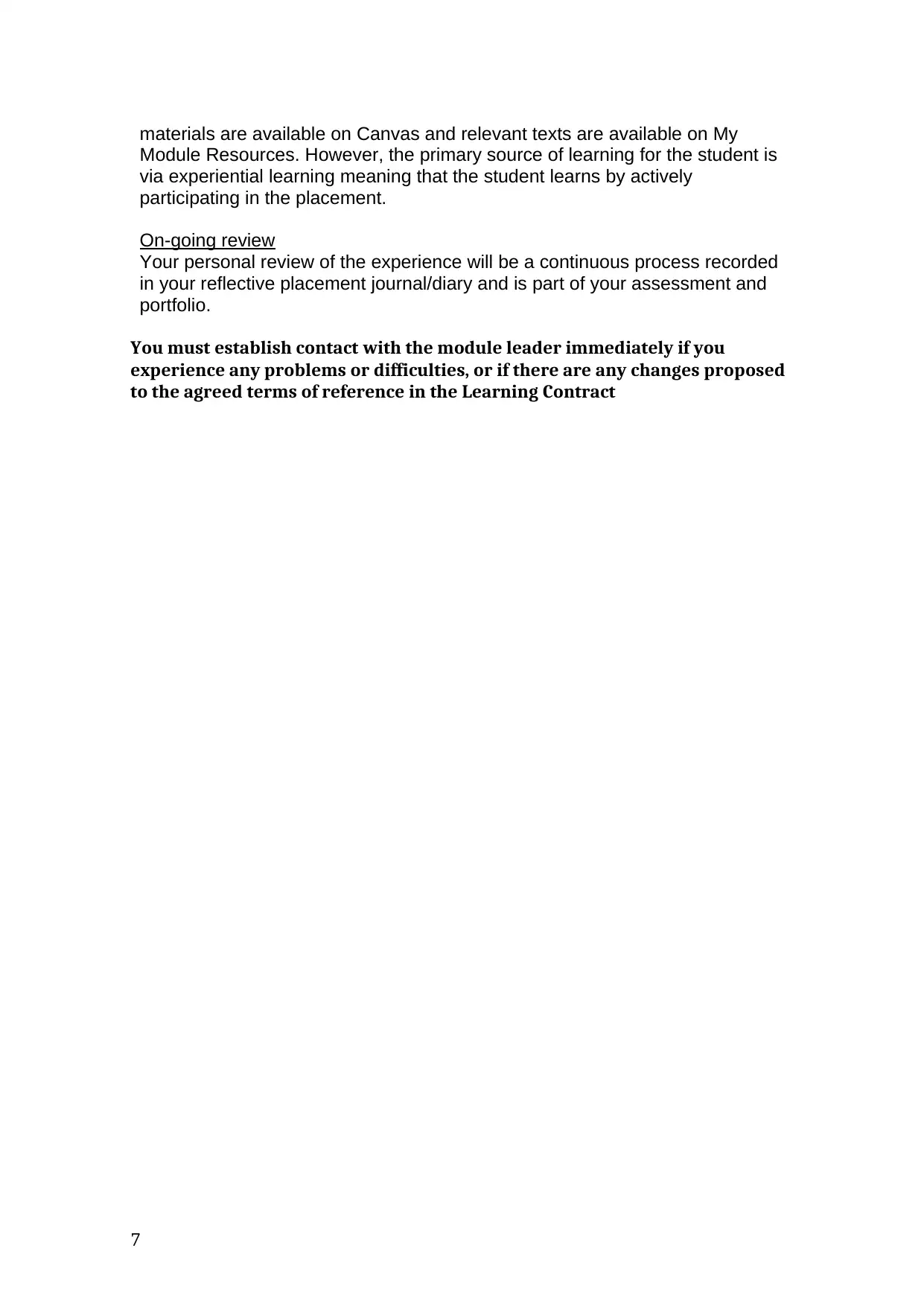
materials are available on Canvas and relevant texts are available on My
Module Resources. However, the primary source of learning for the student is
via experiential learning meaning that the student learns by actively
participating in the placement.
On-going review
Your personal review of the experience will be a continuous process recorded
in your reflective placement journal/diary and is part of your assessment and
portfolio.
You must establish contact with the module leader immediately if you
experience any problems or difficulties, or if there are any changes proposed
to the agreed terms of reference in the Learning Contract
7
Module Resources. However, the primary source of learning for the student is
via experiential learning meaning that the student learns by actively
participating in the placement.
On-going review
Your personal review of the experience will be a continuous process recorded
in your reflective placement journal/diary and is part of your assessment and
portfolio.
You must establish contact with the module leader immediately if you
experience any problems or difficulties, or if there are any changes proposed
to the agreed terms of reference in the Learning Contract
7
Paraphrase This Document
Need a fresh take? Get an instant paraphrase of this document with our AI Paraphraser
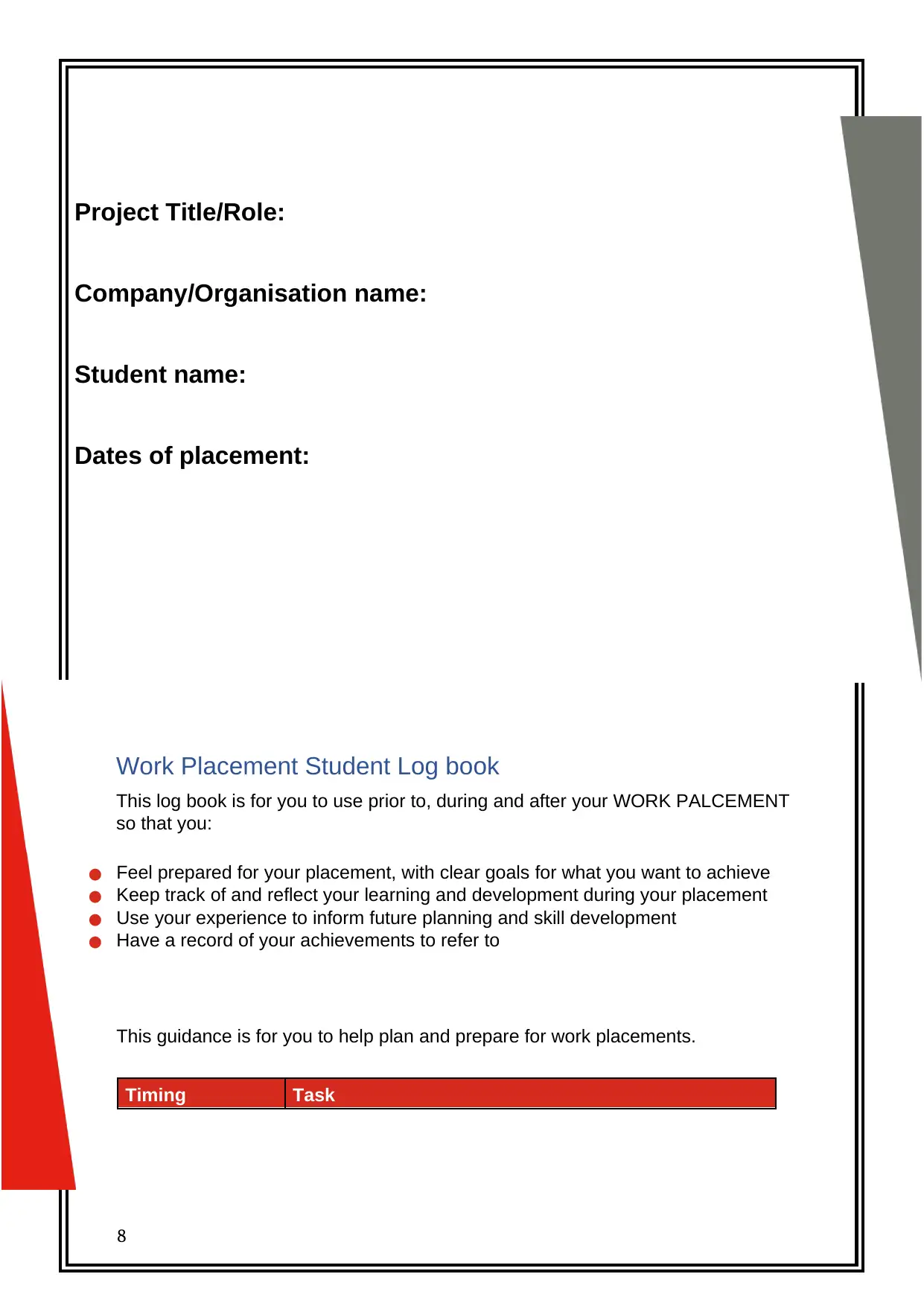
Project Title/Role:
Company/Organisation name:
Student name:
Dates of placement:
Work Placement Student Log book
This log book is for you to use prior to, during and after your WORK PALCEMENT
so that you:
● Feel prepared for your placement, with clear goals for what you want to achieve
● Keep track of and reflect your learning and development during your placement
● Use your experience to inform future planning and skill development
● Have a record of your achievements to refer to
This guidance is for you to help plan and prepare for work placements.
Timing Task
8
Company/Organisation name:
Student name:
Dates of placement:
Work Placement Student Log book
This log book is for you to use prior to, during and after your WORK PALCEMENT
so that you:
● Feel prepared for your placement, with clear goals for what you want to achieve
● Keep track of and reflect your learning and development during your placement
● Use your experience to inform future planning and skill development
● Have a record of your achievements to refer to
This guidance is for you to help plan and prepare for work placements.
Timing Task
8
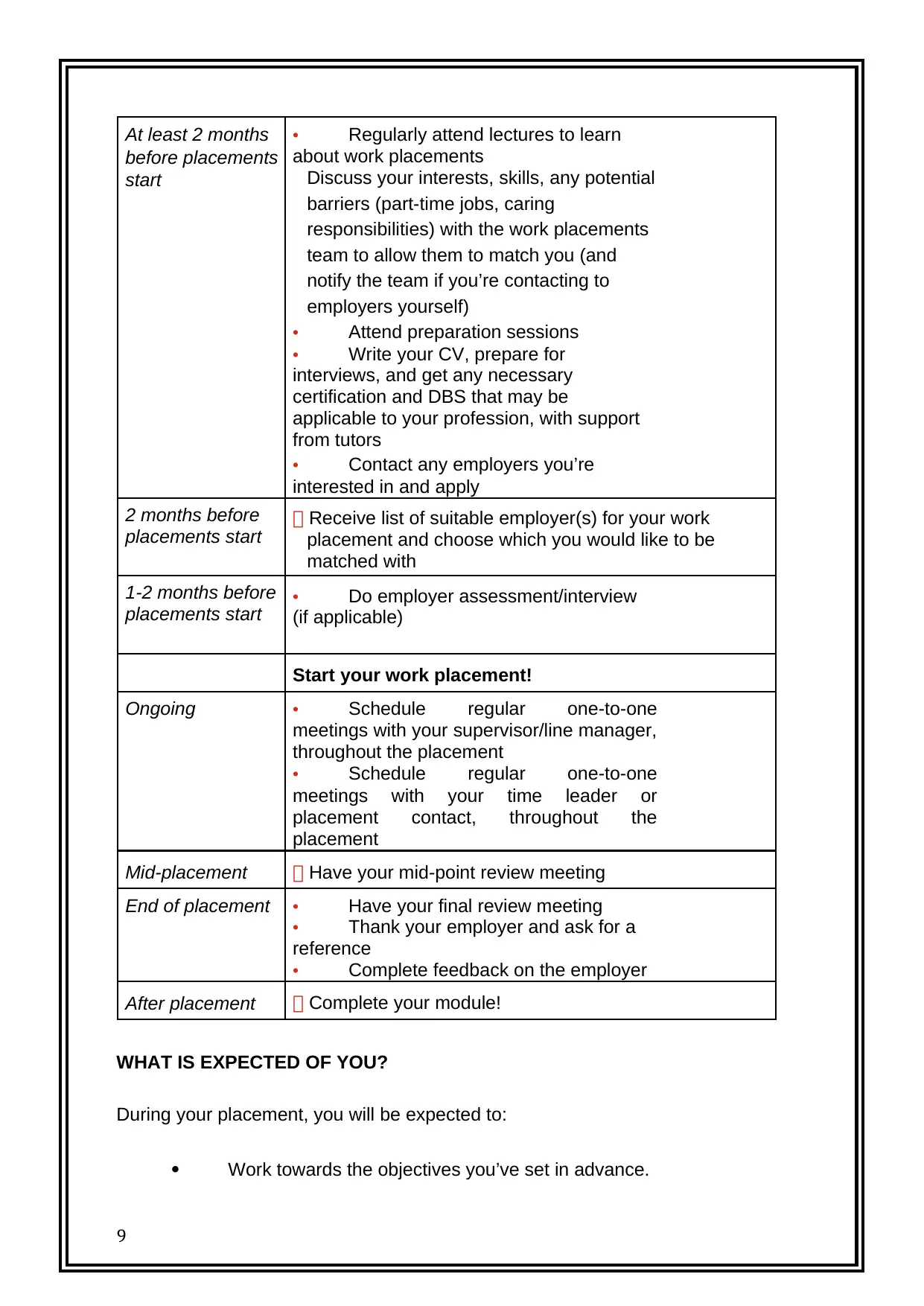
At least 2 months
before placements
start
• Regularly attend lectures to learn
about work placements
Discuss your interests, skills, any potential
barriers (part-time jobs, caring
responsibilities) with the work placements
team to allow them to match you (and
notify the team if you’re contacting to
employers yourself)
• Attend preparation sessions
• Write your CV, prepare for
interviews, and get any necessary
certification and DBS that may be
applicable to your profession, with support
from tutors
• Contact any employers you’re
interested in and apply
2 months before
placements start
Receive list of suitable employer(s) for your work
placement and choose which you would like to be
matched with
1-2 months before
placements start • Do employer assessment/interview
(if applicable)
Start your work placement!
Ongoing • Schedule regular one-to-one
meetings with your supervisor/line manager,
throughout the placement
• Schedule regular one-to-one
meetings with your time leader or
placement contact, throughout the
placement
Mid-placement Have your mid-point review meeting
End of placement • Have your final review meeting
• Thank your employer and ask for a
reference
• Complete feedback on the employer
After placement Complete your module!
WHAT IS EXPECTED OF YOU?
During your placement, you will be expected to:
Work towards the objectives you’ve set in advance.
9
before placements
start
• Regularly attend lectures to learn
about work placements
Discuss your interests, skills, any potential
barriers (part-time jobs, caring
responsibilities) with the work placements
team to allow them to match you (and
notify the team if you’re contacting to
employers yourself)
• Attend preparation sessions
• Write your CV, prepare for
interviews, and get any necessary
certification and DBS that may be
applicable to your profession, with support
from tutors
• Contact any employers you’re
interested in and apply
2 months before
placements start
Receive list of suitable employer(s) for your work
placement and choose which you would like to be
matched with
1-2 months before
placements start • Do employer assessment/interview
(if applicable)
Start your work placement!
Ongoing • Schedule regular one-to-one
meetings with your supervisor/line manager,
throughout the placement
• Schedule regular one-to-one
meetings with your time leader or
placement contact, throughout the
placement
Mid-placement Have your mid-point review meeting
End of placement • Have your final review meeting
• Thank your employer and ask for a
reference
• Complete feedback on the employer
After placement Complete your module!
WHAT IS EXPECTED OF YOU?
During your placement, you will be expected to:
Work towards the objectives you’ve set in advance.
9
⊘ This is a preview!⊘
Do you want full access?
Subscribe today to unlock all pages.

Trusted by 1+ million students worldwide
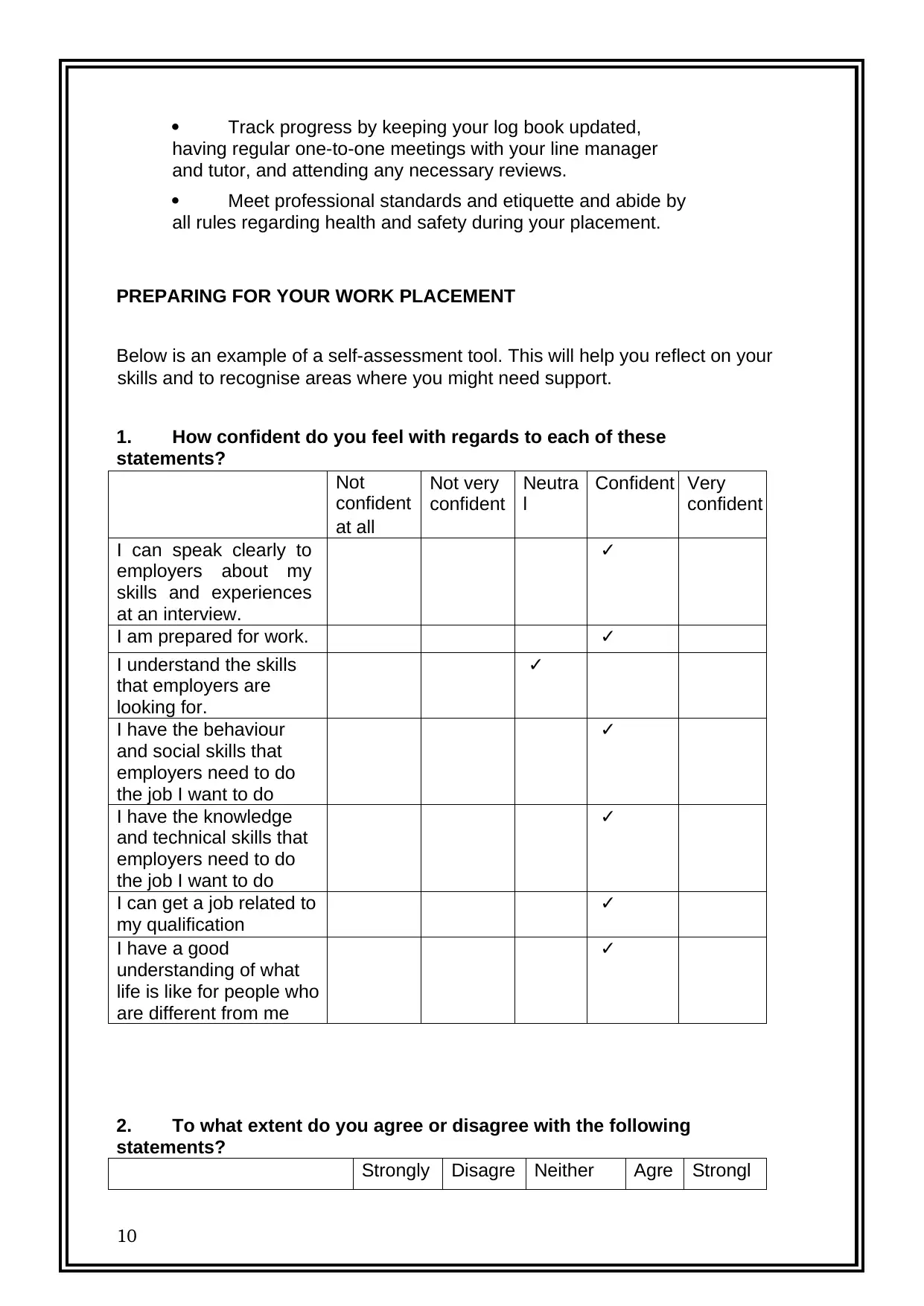
Track progress by keeping your log book updated,
having regular one-to-one meetings with your line manager
and tutor, and attending any necessary reviews.
Meet professional standards and etiquette and abide by
all rules regarding health and safety during your placement.
PREPARING FOR YOUR WORK PLACEMENT
Below is an example of a self-assessment tool. This will help you reflect on your
skills and to recognise areas where you might need support.
1. How confident do you feel with regards to each of these
statements?
Not
confident
at all
Not very
confident
Neutra
l
Confident Very
confident
I can speak clearly to
employers about my
skills and experiences
at an interview.
✓
I am prepared for work. ✓
I understand the skills
that employers are
looking for.
✓
I have the behaviour
and social skills that
employers need to do
the job I want to do
✓
I have the knowledge
and technical skills that
employers need to do
the job I want to do
✓
I can get a job related to
my qualification
✓
I have a good
understanding of what
life is like for people who
are different from me
✓
2. To what extent do you agree or disagree with the following
statements?
Strongly Disagre Neither Agre Strongl
10
having regular one-to-one meetings with your line manager
and tutor, and attending any necessary reviews.
Meet professional standards and etiquette and abide by
all rules regarding health and safety during your placement.
PREPARING FOR YOUR WORK PLACEMENT
Below is an example of a self-assessment tool. This will help you reflect on your
skills and to recognise areas where you might need support.
1. How confident do you feel with regards to each of these
statements?
Not
confident
at all
Not very
confident
Neutra
l
Confident Very
confident
I can speak clearly to
employers about my
skills and experiences
at an interview.
✓
I am prepared for work. ✓
I understand the skills
that employers are
looking for.
✓
I have the behaviour
and social skills that
employers need to do
the job I want to do
✓
I have the knowledge
and technical skills that
employers need to do
the job I want to do
✓
I can get a job related to
my qualification
✓
I have a good
understanding of what
life is like for people who
are different from me
✓
2. To what extent do you agree or disagree with the following
statements?
Strongly Disagre Neither Agre Strongl
10
Paraphrase This Document
Need a fresh take? Get an instant paraphrase of this document with our AI Paraphraser
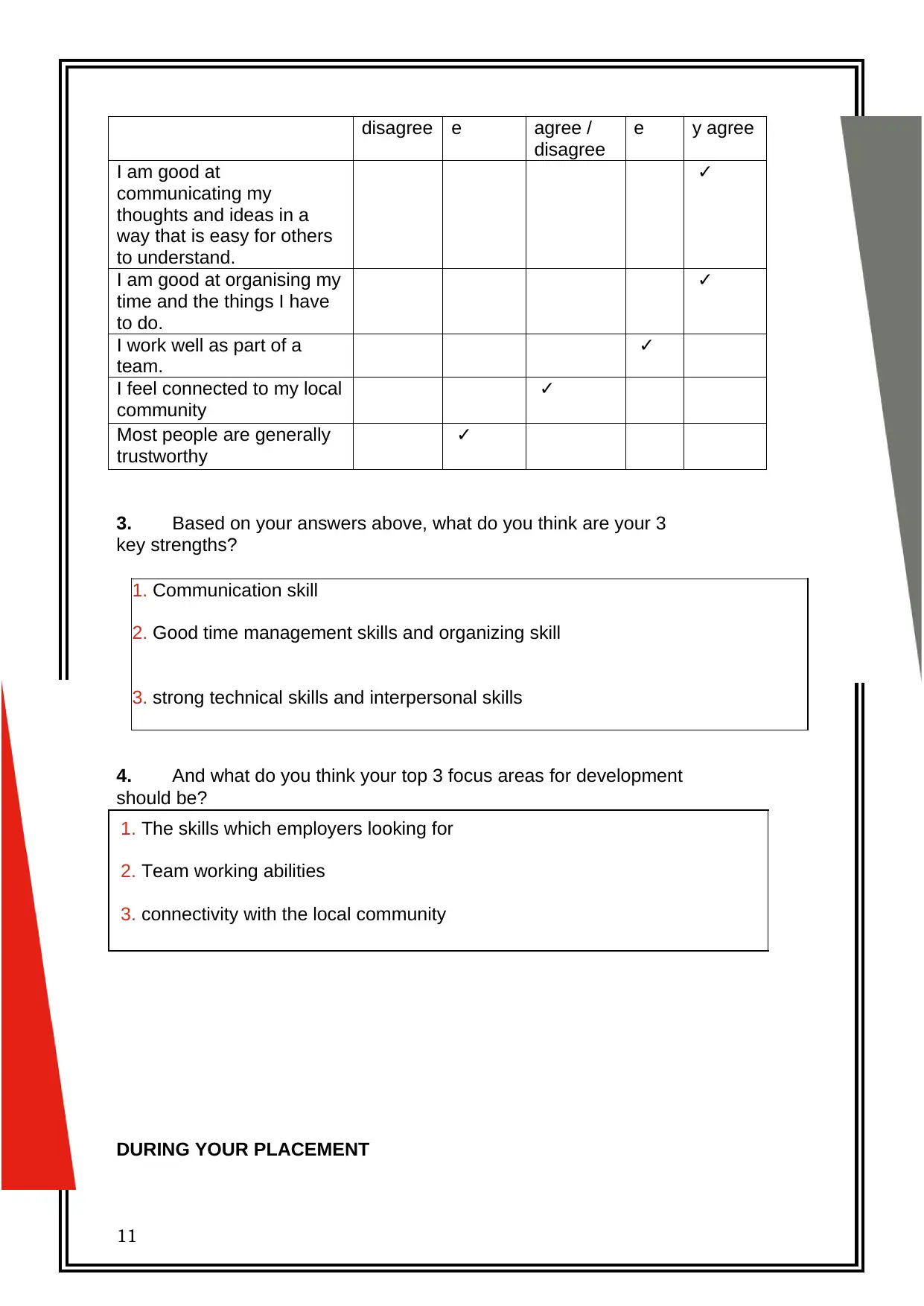
disagree e agree /
disagree
e y agree
I am good at
communicating my
thoughts and ideas in a
way that is easy for others
to understand.
✓
I am good at organising my
time and the things I have
to do.
✓
I work well as part of a
team.
✓
I feel connected to my local
community
✓
Most people are generally
trustworthy
✓
3. Based on your answers above, what do you think are your 3
key strengths?
1. Communication skill
2. Good time management skills and organizing skill
3. strong technical skills and interpersonal skills
4. And what do you think your top 3 focus areas for development
should be?
1. The skills which employers looking for
2. Team working abilities
3. connectivity with the local community
DURING YOUR PLACEMENT
11
disagree
e y agree
I am good at
communicating my
thoughts and ideas in a
way that is easy for others
to understand.
✓
I am good at organising my
time and the things I have
to do.
✓
I work well as part of a
team.
✓
I feel connected to my local
community
✓
Most people are generally
trustworthy
✓
3. Based on your answers above, what do you think are your 3
key strengths?
1. Communication skill
2. Good time management skills and organizing skill
3. strong technical skills and interpersonal skills
4. And what do you think your top 3 focus areas for development
should be?
1. The skills which employers looking for
2. Team working abilities
3. connectivity with the local community
DURING YOUR PLACEMENT
11
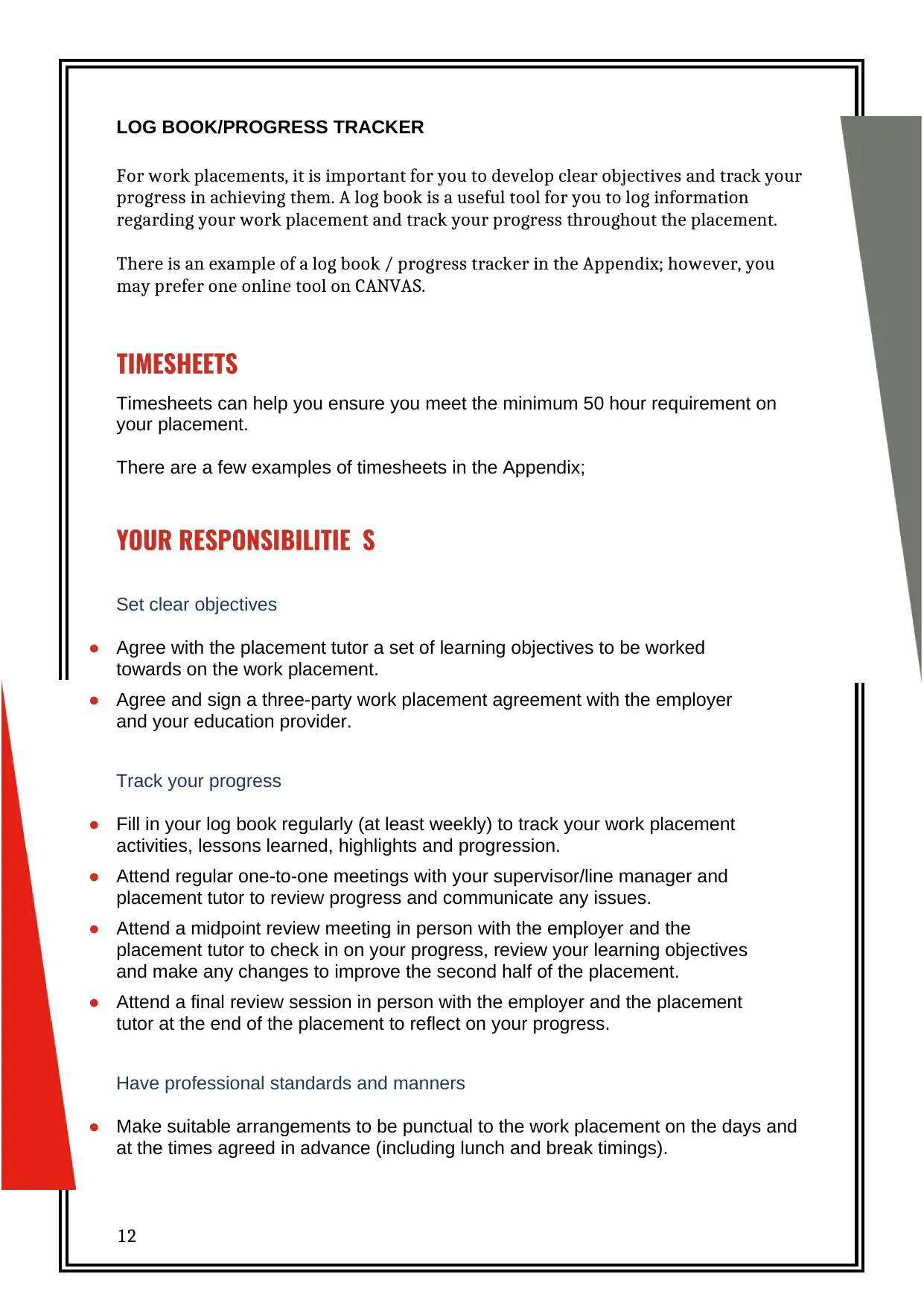
LOG BOOK/PROGRESS TRACKER
For work placements, it is important for you to develop clear objectives and track your
progress in achieving them. A log book is a useful tool for you to log information
regarding your work placement and track your progress throughout the placement.
There is an example of a log book / progress tracker in the Appendix; however, you
may prefer one online tool on CANVAS.
Timesheets can help you ensure you meet the minimum 50 hour requirement on
your placement.
There are a few examples of timesheets in the Appendix;
Set clear objectives
● Agree with the placement tutor a set of learning objectives to be worked
towards on the work placement.
● Agree and sign a three-party work placement agreement with the employer
and your education provider.
Track your progress
● Fill in your log book regularly (at least weekly) to track your work placement
activities, lessons learned, highlights and progression.
● Attend regular one-to-one meetings with your supervisor/line manager and
placement tutor to review progress and communicate any issues.
● Attend a midpoint review meeting in person with the employer and the
placement tutor to check in on your progress, review your learning objectives
and make any changes to improve the second half of the placement.
● Attend a final review session in person with the employer and the placement
tutor at the end of the placement to reflect on your progress.
Have professional standards and manners
● Make suitable arrangements to be punctual to the work placement on the days and
at the times agreed in advance (including lunch and break timings).
12
For work placements, it is important for you to develop clear objectives and track your
progress in achieving them. A log book is a useful tool for you to log information
regarding your work placement and track your progress throughout the placement.
There is an example of a log book / progress tracker in the Appendix; however, you
may prefer one online tool on CANVAS.
Timesheets can help you ensure you meet the minimum 50 hour requirement on
your placement.
There are a few examples of timesheets in the Appendix;
Set clear objectives
● Agree with the placement tutor a set of learning objectives to be worked
towards on the work placement.
● Agree and sign a three-party work placement agreement with the employer
and your education provider.
Track your progress
● Fill in your log book regularly (at least weekly) to track your work placement
activities, lessons learned, highlights and progression.
● Attend regular one-to-one meetings with your supervisor/line manager and
placement tutor to review progress and communicate any issues.
● Attend a midpoint review meeting in person with the employer and the
placement tutor to check in on your progress, review your learning objectives
and make any changes to improve the second half of the placement.
● Attend a final review session in person with the employer and the placement
tutor at the end of the placement to reflect on your progress.
Have professional standards and manners
● Make suitable arrangements to be punctual to the work placement on the days and
at the times agreed in advance (including lunch and break timings).
12
⊘ This is a preview!⊘
Do you want full access?
Subscribe today to unlock all pages.

Trusted by 1+ million students worldwide
1 out of 48
Related Documents
Your All-in-One AI-Powered Toolkit for Academic Success.
+13062052269
info@desklib.com
Available 24*7 on WhatsApp / Email
![[object Object]](/_next/static/media/star-bottom.7253800d.svg)
Unlock your academic potential
Copyright © 2020–2026 A2Z Services. All Rights Reserved. Developed and managed by ZUCOL.



